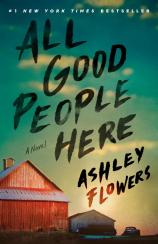All Good People Here
Review
All Good People Here
Ashley Flowers, the host and producer of the top-rated podcast “Crime Junkie,” makes her fiction debut with ALL GOOD PEOPLE HERE, a ripped-from-the-headlines thriller populated by richly layered characters and propelled by increasingly chilling plot twists.
It has been 25 years since January Jacobs, a six-year-old pageant winner from the small town of Wakarusa, Indiana, disappeared from her princess-themed bedroom, only feet away from the rooms of her sleeping parents and her twin brother, Jace. When January’s mother, Krissy, woke up the next morning, a violent, shocking message was spray-painted on her white wall, a basement window had been smashed and January was gone.
Unsurprisingly, when the girl was found murdered in a ditch nearby, Wakarusa --- fueled by gossip mills and conservative judgments --- was quick to turn on her family, particularly too-pretty-for-her-own-good Krissy, who just could not seem to grieve the way the town wanted her to grieve. Although two-and-a-half decades have passed, January’s killer has never been brought to justice, and the Jacobs family has been torn to shreds: Jace moving out after a teenagehood of delinquency and Krissy dying by suicide only a few years later.
"In a genre overrun by gratuitous violence against female characters, Flowers has applied everything she has learned from her own investigations to create a thriller that doesn’t shy away from the truth about violent crimes, but doesn’t celebrate or forgive them either."
But there was another person in Wakarusa who loved January: her best friend, Margot Davies, who lived across the street from her and grew up wondering about the mysterious, unseen man who may have stood in the street between their homes, eeny-meeny-miny-mo-ing his way to kill a young girl. In the years since January’s death, Margot survived her own traumas: a mean alcoholic father, a mother too concerned with saving face to seek help, and now the early-onset dementia of her uncle, Luke, the closest thing to a mother, father and best friend Margot has. Despite her vow to leave and never go back to stifling, judgmental Wakarusa, she convinces her editor to let her work remotely and returns home to care for Luke, recently widowed and having a harder time than ever dealing with the realities of his disease.
Coming home to Wakarusa immediately draws memories of January to the surface, but it is not until another girl, five-year-old Natalie Clark, goes missing from the next town over that Margot is not the only one thinking about January. Though the townsfolk were once quick to crucify, attack and abandon January’s mother as her killer, they are now thoroughly engaged in some fast-acting revisionist history, as they cast the poor and bereaved Krissy as a fellow victim. The town doesn’t hesitate to proclaim that the same unidentified man who killed January must be at work again, and when her father’s barn is graffitied with another sinister message, the connections seem to be building.
With the local police writing off the cases as unrelated and the connections as hoaxes, it seems that only Margot is willing to probe deeper and look at January’s case again with fresh eyes. But Margot is also biased: January’s murder was very personal to her, and with her uncle sick, her career at risk yet again and her financial future uncertain, she cannot help but wonder if she is paranoid, finding connections and missing links where there are none.
Just as she does in her hit podcast, Ashley Flowers not only lays bare the details of a violent, timely case, she takes a close, hard-hitting look at the communities where these crimes occur. Through alternating timelines detailing both the fallout of January’s death (and the blaming of her mother) and Margot’s own investigation into the case, Flowers doesn’t just pen a tautly woven, action-packed thriller. She takes our obsession with true crime, judging mothers and gossip head on, exposing some of the many fault lines in how we approach our most vulnerable. The town of Wakarusa acts as a third main character, as full of life and dynamism as Margot or Krissy, always simmering and bubbling over, but never quite changing at its heart. As Flowers shows, small towns like these are often a double-edged sword for their citizens: tight-knit and community-based, but equally watchful and judgmental, always prone to spreading rumors that become stories and the capital-T Truth.
I’m a longtime fan of Flowers’ podcasts, so I know how well she can tell a story, how easily she can sum up years or even decades of history, and how potently she can craft a metaphor. That she would write a thriller seems like a natural progression and use of her skills, and she wields her knowledge of true crime expertly, introducing twist after twist and constantly shocking her readers without ever being voyeuristic or heavy-handed. That said, there were some trademarks of a debut author here that I look forward to Flowers polishing in future books (and I truly do hope she’ll write more; I’ll preorder them the day they’re announced!): the dialogue could be a bit stilted, and while the middle of the book seemed too slow, the end was rushed, a choice that drew away from, rather than supported, her expertly crafted final twist (and oh, what a twist it is).
Despite these quibbles, ALL GOOD PEOPLE HERE is an urgent and necessary book for thriller lovers, true-crime junkies and anyone who has gossiped about their neighbors (or done something gossip-worthy themselves). In a genre overrun by gratuitous violence against female characters, Flowers has applied everything she has learned from her own investigations to create a thriller that doesn’t shy away from the truth about violent crimes, but doesn’t celebrate or forgive them either.
Reviewed by Rebecca Munro on August 26, 2022




